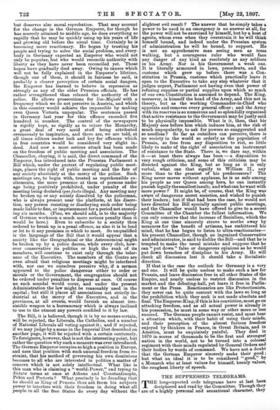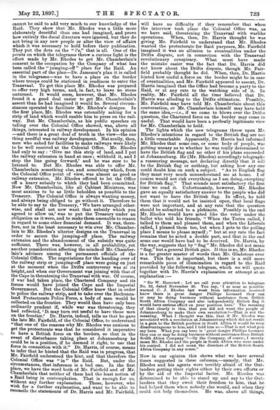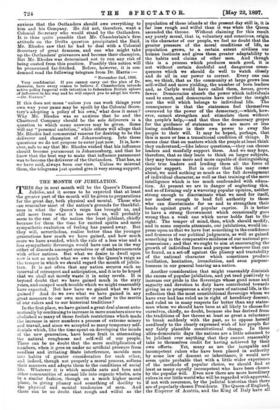THE SUPPRESSED TELEGRAMS.
THE long-expected code telegrams have at last been deciphered and read by the Committee. Though they are of a highly personal and sensational character, they cannot be said to add very much to our knowledge of the Raid. They show that Mr. Rhodes was a little more elaborately deceitful than one had imagined, and prove how entirely the ducal directors were ignored, but they do not bring in any new people or alter the view of affairs which it was necessary to hold before their publication. They put the dots on the " i's," that is all. One of the points on which the telegrams throw a curious light is the effort made by Mr. Rhodes to get Mr. Chamberlain's consent to the occupation by the Company of what has been called the "jumping-off " place for the Raid. An essential part of the plan—Dr. Jameson's plan it is called in the telegrams—was to have a place on the border where troops could be stationed in readiness to enter the Transvaal. To get this place Mr. Rhodes was prepared to offer very high terms, and, in fact, to leave no stone unturned. It would seem, however, that Mr. Rhodes found it a good deal easier to get Mr. Chamberlain's assent than he had imagined it would be. Several circum- stances operated to facilitate Mr. Rhodes's designs. In the first place, Mr. Rhodes was ostensibly asking for a strip of land which would enable him to press on the rail- way. But Mr. Chamberlain, as his public speeches on taking over the Colonial Office showed, was, above all things, interested in railway development. In his opinion —and there is a great deal of truth in the view—the one thing needful was railway development. Nat urally, then, men who asked for facilities to make railways were likely to be well received at the Colonial Office. Mr. Rhodes had only to say : ' Give me this strip of land, and I put the railway extension in hand at once ; withhold it, and I stop the line going forward,' and he was sure to be listened to. But Mr. Rhodes was able to offer Mr. Chamberlain something else, and something which, from the Colonial Office point of view, was almost as good as railway extension. Mr. Rhodes offered to let the Office off a heavy subsidy to which they had been committed. Now Mr. Chamberlain, like all Cabinet Ministers, was most anxious to be as little beholden as possible to the Treasury. The Colonial Office is always wanting money, and always being obliged to go without it. Therefore to be able to say to the Treasury, We have arranged other- wise, and shall not now want that subsidy which you agreed to allow us,' was to put the Treasury under an obligation as it were, and to make them amenable to reason in regard to some other financial demand. It was, there- fore, not in the least necessary to win over Mr. Chamber- lain to Mr. Rhodes's ulterior designs on the Transvaal in order to secure the jumping-off place. The railway extension and the abandonment of the subsidy was quite sufficient. There was, however, in all probability, yet another consideration affecting the minds of Mr. Chamber- lain's advisers among the permanent officials of the Colonial Office. The negotiations for the handing over of the railway strip or jumping-off place were going on just at the moment when the Drifts controversy was at its height, and when our Government was joining with that of the Cape in threatening the Transvaal with war. Of course, if war had taken place, the Chartered Company and its forces would have joined the Cape and the Imperial Government. But the Colonial Office knew that in order to police the railway strip, and to take over the Bechuana- land Protectorate Police Force, a body of men would be collected on the frontier. They would then have only been ordinarily prudent if, while war was threatening, they had reflected, It may turn out useful to have those men on the frontier.' Dr. Harris, indeed, tells us that he gave the late Mr. Fairfield, of the Colonial Office, to understand "that one of the reasons why Mr. Rhodes was anxious to get the protectorate was that he considered it imperative to have a British force on the borders, so that in the event of disturbance taking place at Johannesburg he could be in a position, if he deemed it right, to use that force in connection with it." Dr. Harris, of course, means to infer that he hinted that the Raid was in progress, that Mr. Fairfield understood the hint, and that therefore the Colonial Office was " in " the Raid. But, under the circumstances, that inference is a bad one. In the first place, we have the word both of Mr. Fairfield and of Mr. Chamberlain that neither of them had the least notion of a Raid being in contemplation. That is enough for us, without any further explanation. Those, however, who wish for a further explanation, and want to be able to reconcile the statements of Dr. Harris and Mr. Fairfield, will have no difficulty if they remember that when the interview took place the Colonial Office was, as we have said, threatening the Transvaal with warlike operations. When, then, Dr. Harris thought he was giving Mr. Fairfield to understand that Mr. Rhodes- wanted the protectorate for Raid. purposes, Mr. Fairfield imagined it was an allusion to eventualities under the Drifts dispute, not in connection with the Transvaal revolutionary conspiracy. What must have made the mistake easier was the fact that Dr. Harris did not know about the Drifts dispute, though Mr. Fair- field probably thought he did. .When, then, Dr. Harris- hinted how useful a force on the border might be in case of eventualities, and Mr. Fairfield appeared to assent, Dr. Harris imagined that the Office had become a party to the Raid, or at any rate to the watching side of it. In reality, Mr. Fairfield all the time believed that Dr. Harris was alluding to the Drifts ultimatum. Possibly, Mr. Fairfield may have told Mr. Chamberlain about this conversation, or Mr. Chamberlain himself may have held the same idea,—i.e., if we come to blows over the Drifts question, the Chartered force on the border may come in useful. That would have been a perfectly legitimate view for Mr. Chamberlain to hold.
The lights which the new telegrams throw upon Mr. Rhodes's intentions in regard to the British flag are not a little remarkable. Apparently, Dr. Harris had informed Mr. Rhodes that some one, or some body of people, was getting uneasy as to whether he was really determined to have the British flag and no other if his plans succeeded at Johannesburg. He (Mr. Rhodes) accordingly telegraphs a reassuring message, not declaring directly that it will be the British flag or nothing, but asking how any one could doubt him on such a subject. "As to English flag they must very much misunderstand me at home. I of course would not risk everything as I am doing, excepting for British flag." That sounds most satisfactory the first time we read it. Unfortunately, however, Mr. Rhodes gave an equally satisfactory answer to the people who did not want to have the British flag. In effect, he told them that it would not be insisted upon, that local flags were not important, and at any rate that the question should be submitted to a plebiscite. Possibly in the end Mr. Rhodes would have acted like the voter under the ballot who told his friends, " When the Tories called, I talked to them and pleased them, and when the Liberals called, I pleased them too, but when I gets to the polling place I means to please myself ; " but at any rate the fact remains that he acted a double part, and that in the end some one would have had to be deceived. Dr. Harris, by the way, suggests that by " flag" Mr. Rhodes did not mean " flag," but a, general British gain. If this is so, Mr. Rhodes is a far greater master of words than Mr. Gladstone ever was. This fact is important, but there is a still more remarkable piece of illumination in regard to the Raid provided by the following telegram, which we will quote together with Dr. Harris's explanation or attempt at an explanation :- " Sir W. Harcourt : Let me call your attention to telegram No. 32, dated November 26. You say, I as near as possible warned C. J. Rhodes last week from information received know there is great danger Phillips Leonard they can or may be doing business without assistance from British South Africa Company and also independently British flag it would have serious effect on your position here.' The meaning of that clearly is this, that you did not want the people of Johannesburg to make their own revolution ?—That is not the meaning. What I thought was this, that if Mr. Rhodes was associated with a revolution at Johannesburg which did not result in a gain to the British position in South Africa it would be very disadvantageous to him, and I told him so.—That is not what you say here. What you say here is great danger Phillips Leonard they can or may be doing business without assistance from British South Africa Company ' ?-13y the Company, of course, I merely mean Mr. Rhodes and the people in South Africa who were under his control. I did not mean the directors of the British South Africa Company in any sense."
Now in our opinion this shows what we have several times suggested in these columns,—namely, that Mr. Rhodes and his agents were terribly afraid of the Out- landers getting their rights either by their own efforts or by the aid of the Imperial factor. Mr. Rhodes was determined to be able to stand up and say to the Out- landers that they owed their freedom to him, that he had helped them when nobody else would, and when they could not help themselves. He was, above all things, anxious that the Outlanders should owe everything to him and his Company. He did not, therefore, want a Colonial Secretary who would stand by the Outlanders. It is thus quite possible that Mr. Chamberlain's firm attitude on the Drifts question precipitated the Raid. Mr. Rhodes saw that he had to deal with a Colonial Secretary of great firmness, and one who might take up the Outlanders' grievances and become their champion. But Mr. Rhodes was determined not to run any risk of being ousted from this position. Possibly this notion will be pronounced far-fetched. Before, however, it is con- demned read the following telegram from Dr. Harris :- " November 2nd, 1895.
Very confidential. If you cannot carry out the plan of Dr. Jameson, have every reason to believe J. Chamberlain intends active policy Imperial with intention to federation British sphere of influence in his way and he will expect you to adopt his views. —Dr. HARRIS."
If this does not mean unless you can work things your own way your game may be spoilt by the Colonial Secre- tary's adopting a policy of his own,' what does it mean ? Why Mr. Rhodes was so anxious that he and the Chartered Company should be the sole deliverers is a question to which many answers may be given. Some will say " personal ambition," while others will allege that Mr. Rhodes had commercial reasons for desiring to be the deliverer and champion of Johannesburg. Into these questions we do not propose to enter just now. It is, how- ever, safe to say that Mr. Rhodes wished that his influence should become paramount in Johannesburg, and that he knew that the best way to make that influence paramount was to become the deliverer of the Outlanders. That has, as we have said, always been our view. Unless we misread them, the telegrams just quoted give it very strong support.








































 Previous page
Previous page